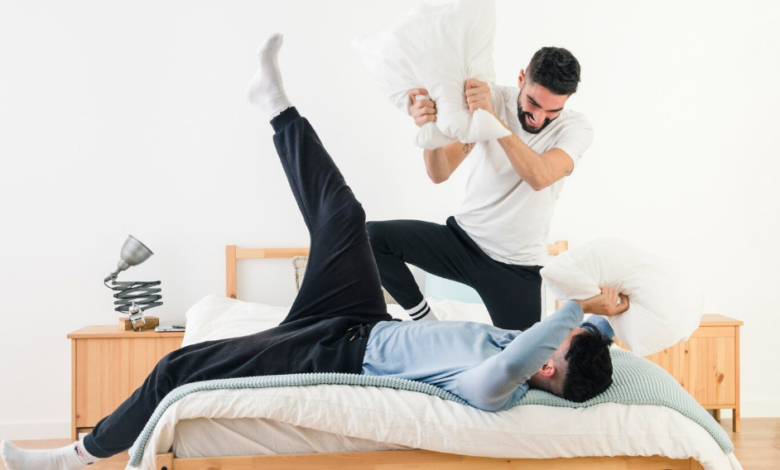Effective Snoring Solutions Available Right Here in Poway

Understanding the Root Causes of Snoring in Poway Residents
Snoring, a common issue affecting many in Poway, isn’t just a nighttime annoyance; it can point to underlying health concerns. Figuring out why you snore is the first step toward finding effective solutions, including [
Non-Invasive Approaches for Quieter Nights in Poway
If you’re looking for snoring treatment in Poway, you might want to start with the least invasive options. Luckily, there are several things you can try before considering more intense treatments for sleep apnea in Poway. These approaches focus on lifestyle adjustments and simple aids to help reduce snoring and improve your sleep quality. Let’s explore some of these methods.
Positional Therapy and Sleep Aids
Changing your sleep position can make a big difference. Sleeping on your side instead of your back often reduces snoring. When you lie on your back, your tongue and soft palate can collapse into your airway, causing vibrations that lead to snoring. Positional therapy involves using pillows or devices to help you stay on your side throughout the night. There are also sleep aids like adjustable beds that can elevate your head, which can also help open up your airways. I tried a wedge pillow once, and it was surprisingly helpful, though it took a few nights to get used to.
Dietary Adjustments and Weight Management
What you eat and how much you weigh can significantly impact your snoring. Being overweight, especially around the neck, can narrow your airway and make snoring worse. Making dietary adjustments and managing your weight can help alleviate this. Here are a few things to consider:
- Reduce alcohol consumption, especially before bed.
- Avoid heavy meals close to bedtime.
- Focus on a balanced diet with plenty of fruits and vegetables.
Losing even a small amount of weight can make a noticeable difference in your snoring. It’s not about drastic changes; small, sustainable adjustments can lead to big improvements over time.
Over-the-Counter Solutions and Nasal Strips
There are many over-the-counter (OTC) solutions available that can help reduce snoring. Nasal strips are a popular option. They work by widening your nasal passages, which can improve airflow and reduce snoring. Nasal sprays can also help clear congestion and open up your airways. I’ve used nasal strips before when I had a cold, and they did seem to help me breathe easier at night. Just remember that these solutions might not be effective for everyone, especially if you have more severe sleep apnea in Poway. It’s always a good idea to talk to a doctor if your snoring persists despite trying these methods.
Advanced Dental Appliances for Sleep Apnea in Poway
If you’re dealing with sleep apnea in Poway, you might be surprised to learn that your dentist can be a key player in finding a solution. While CPAP machines are often the first line of defense, dental appliances offer a less invasive alternative for many people. These devices, custom-fitted by your dentist, can help keep your airway open while you sleep, reducing snoring and improving your overall sleep quality. Let’s explore some of the options available for snoring treatment in Poway.
Custom-Fitted Oral Mandibular Advancement Devices
Mandibular Advancement Devices (MADs) are probably the most common type of dental appliance used for sleep apnea. These devices work by gently pushing your lower jaw (mandible) forward. This movement helps to open up your airway, preventing it from collapsing during sleep. The custom fit is super important because it ensures the device is comfortable and effective. A poorly fitted MAD can cause jaw pain or discomfort, so it’s worth investing in a professionally fitted one. Here’s a quick look at some of the benefits:
- Reduced snoring
- Improved sleep quality
- Non-invasive treatment option
MADs are often a great alternative for people who can’t tolerate CPAP machines. They’re smaller, more portable, and don’t require electricity, making them convenient for travel.
Tongue Retaining Devices for Specific Cases
Tongue Retaining Devices (TRDs) are another type of dental appliance, but they work a bit differently. Instead of moving your jaw, a TRD holds your tongue in place to prevent it from falling back and blocking your airway. These devices aren’t as common as MADs, but they can be very effective for people whose tongues contribute significantly to their sleep apnea. Here’s a comparison:
| Feature | MAD | TRD |
| Primary Action | Moves lower jaw forward | Holds tongue in place |
| Common Use | General sleep apnea | Tongue-related sleep apnea |
| Comfort | Can cause jaw discomfort if not fitted properly | Can feel awkward initially |
The Role of Your Poway Dentist in Appliance Selection
Choosing the right dental appliance is a collaborative process that involves your dentist and potentially a sleep specialist. Your dentist will evaluate your oral health, take impressions of your teeth, and discuss your sleep apnea symptoms to determine the best option for you. They’ll also ensure the appliance fits properly and provide instructions on how to use and care for it. Here are some key steps in the process:
- Initial consultation and evaluation
- Impressions and custom fitting
- Follow-up appointments for adjustments
Your dentist plays a vital role in managing your sleep apnea in Poway. They can help you find a comfortable and effective solution that improves your sleep and overall health. Don’t hesitate to reach out and explore your options!
CPAP Therapy: A Gold Standard for Sleep Apnea in Poway
CPAP, or Continuous Positive Airway Pressure, is often considered the go-to treatment for sleep apnea in Poway, and for good reason. It’s been around for a while, and it’s proven to be pretty effective for many people. Basically, it involves wearing a mask while you sleep that’s connected to a machine that blows air into your airways. This keeps them open, preventing those pauses in breathing that characterize sleep apnea. It’s not always the most comfortable thing, but it can make a huge difference in sleep quality and overall health. Finding the right snoring treatment in Poway can be a game changer.
Navigating Different CPAP Machine Options
There are a few different types of CPAP machines out there, and it can be a bit confusing trying to figure out which one is right for you. The standard CPAP delivers a constant pressure, while BiPAP machines adjust the pressure depending on whether you’re inhaling or exhaling. There are also APAP machines, which automatically adjust the pressure based on your breathing patterns. Each has its pros and cons, and what works best really depends on the individual. It’s worth talking to your doctor or a sleep specialist to get their recommendation.
- Standard CPAP: Constant pressure
- BiPAP: Variable pressure based on breathing
- APAP: Automatically adjusting pressure
Optimizing Mask Fit and Comfort for Compliance
Okay, let’s be real: wearing a mask all night isn’t exactly a dream. But getting the right fit is super important for actually using the CPAP consistently. If the mask is too tight, it can cause pressure sores. Too loose, and it leaks air, which makes the whole thing less effective. There are different types of masks – nasal masks, full face masks, nasal pillow masks – so experiment to see what feels best. Also, make sure to clean your mask regularly to prevent skin irritation and keep it hygienic.
Finding the right mask and getting it properly fitted can take some trial and error, but it’s worth the effort. A comfortable mask means you’re more likely to stick with the therapy, and that’s the key to seeing real benefits.
Local Support and Resources for CPAP Users in Poway
One of the best things about getting CPAP therapy is that you’re not alone. There are plenty of resources available right here in Poway to help you get the most out of your treatment. Local hospitals and clinics often have support groups where you can connect with other CPAP users and share tips and experiences. There are also online forums and communities where you can ask questions and get advice. Don’t hesitate to reach out and take advantage of these resources – they can make a big difference in your journey to better sleep and finding the right snoring treatment in Poway.
Here’s a quick list of potential resources:
- Local hospital sleep clinics
- Online CPAP support forums
- Medical equipment suppliers in Poway
Surgical Interventions for Persistent Snoring and Sleep Apnea
Sometimes, non-surgical options just don’t cut it for treating severe snoring and sleep apnea in Poway. When that happens, surgery might be the next step. It’s not the first thing doctors usually recommend, but for some people, it can make a real difference in their sleep quality and overall health. Let’s explore some of the surgical options available.
Uvulopalatopharyngoplasty (UPPP) and Its Efficacy
UPPP, or Uvulopalatopharyngoplasty, is a procedure that aims to widen the airway by removing excess tissue in the throat. It’s been around for a while, and while it can be effective, it’s not a guaranteed fix for everyone. The surgery involves removing the uvula, part of the soft palate, and sometimes the tonsils. Recovery can be a bit rough, with a sore throat and difficulty swallowing for a week or two. It’s important to have realistic expectations about the outcome. UPPP is more effective for snoring than for severe sleep apnea.
Here’s a quick look at what to expect:
- Initial consultation and evaluation
- Surgical procedure under general anesthesia
- Post-operative pain management
- Follow-up appointments to monitor healing
Minimally Invasive Procedures for Airway Remodeling
These days, there are less invasive surgical options that aim to remodel the airway without major tissue removal. These procedures often use radiofrequency ablation or laser technology to shrink or stiffen tissues in the soft palate and tongue base. The goal is to open up the airway and reduce snoring and sleep apnea episodes. Recovery is generally quicker and less painful compared to UPPP. These procedures might include things like:
- Radiofrequency ablation of the tongue base
- Laser-assisted uvulopalatoplasty (LAUP)
- Pillar procedure (placing small implants in the soft palate)
Minimally invasive procedures are often preferred because they involve smaller incisions, less pain, and faster recovery times. However, their long-term effectiveness can vary, and some people may still need additional treatment.
Considering Surgical Options with Poway Specialists
Deciding whether surgery is right for your snoring treatment in Poway or sleep apnea in Poway is a big decision. It’s important to talk to a specialist who can evaluate your specific situation and explain the risks and benefits of each procedure. They’ll consider factors like the severity of your sleep apnea, your overall health, and your preferences. Don’t hesitate to ask questions and get a second opinion before moving forward. A good specialist will help you weigh all your options and make an informed choice. Here are some things to consider:
- Thorough evaluation of your sleep apnea severity
- Discussion of all non-surgical options first
- Realistic expectations about surgical outcomes
Holistic and Lifestyle Changes for Better Sleep in Poway
Establishing a Consistent Sleep Hygiene Routine
Okay, so you’re looking for snoring treatment in Poway, and maybe even suspect you have sleep apnea in Poway? Before jumping to appliances or surgery, let’s talk about the basics. Sleep hygiene. It sounds fancy, but it’s really just about setting yourself up for sleep success. Think of it like this: you wouldn’t run a marathon without stretching, right? Same deal with sleep.
- Go to bed and wake up around the same time every day, even on weekends. I know, it sounds awful, but your body will thank you.
- Create a relaxing bedtime routine. A warm bath, reading a book (a real one, not on a screen), or some gentle stretching can work wonders.
- Make sure your bedroom is dark, quiet, and cool. Think cave-like. Blackout curtains, earplugs, and a fan can be your best friends.
It’s easy to fall into bad habits, like scrolling through your phone before bed or having a late-night snack. But trust me, making small changes to your routine can make a big difference in your sleep quality. It’s not a quick fix, but it’s a foundation for better sleep.
Stress Reduction Techniques for Improved Sleep Quality
Stress is a sleep killer. Plain and simple. If you’re tossing and turning, replaying the day’s events, or worrying about tomorrow, your body is in fight-or-flight mode, not sleep mode. Finding ways to manage stress is key, especially if you’re dealing with snoring or suspect sleep apnea in Poway.
- Try meditation or mindfulness exercises. There are tons of free apps and online resources to get you started.
- Practice deep breathing techniques. Even a few minutes of focused breathing can calm your nervous system.
- Engage in activities you enjoy. Whether it’s painting, gardening, or spending time with loved ones, make time for things that bring you joy.
Stress reduction is not a one-size-fits-all solution; experiment to find what works best for you.
The Benefits of Regular Exercise for Respiratory Health
Exercise is good for pretty much everything, including sleep. But it’s not just about burning calories; regular physical activity can actually improve your respiratory health, which can be a big help if you’re dealing with snoring or sleep apnea in Poway.
- Aim for at least 30 minutes of moderate-intensity exercise most days of the week. Walking, jogging, swimming, or cycling are all great options.
- Avoid exercising too close to bedtime. A workout can be stimulating, so give yourself a few hours to wind down before hitting the hay.
- Consider incorporating breathing exercises into your routine. Yoga and Pilates can be particularly beneficial for improving lung capacity and reducing snoring.
| Exercise Type | Frequency | Intensity | Benefits |
| Walking | Daily | Moderate | Improves cardiovascular health, reduces stress |
| Yoga | 2-3 times/week | Low to Moderate | Enhances breathing, promotes relaxation |
| Swimming | 1-2 times/week | Moderate to High | Strengthens respiratory muscles |
Finding the Right Sleep Specialist for Sleep Apnea in Poway
Finding the right doctor is super important, especially when you’re dealing with something like sleep apnea. It can be a real pain, and getting good help makes all the difference. If you’re looking for snoring treatment in Poway or need help with sleep apnea in Poway, here’s how to find someone who’s a good fit for you.
Questions to Ask During Your Initial Consultation
Okay, so you’ve found a few sleep specialists. Now what? The first meeting is your chance to see if they’re the right person. Don’t be shy – ask questions! Here are a few ideas:
- What’s your experience with treating sleep apnea?
- What treatment options do you usually recommend?
- What are the pros and cons of each treatment?
- How will we track my progress?
- What are the costs involved, and what does my insurance cover?
It’s also good to ask about their approach to treatment. Do they focus on CPAP machines, oral appliances, or something else? Do they listen to your concerns and preferences? You want someone who’s willing to work with you to find the best solution.
Understanding Sleep Studies and Diagnostic Testing
Before you can get treatment, you’ll probably need a sleep study. This is where they monitor you while you sleep to see what’s going on. There are a couple of ways to do this:
- In-lab sleep study: You spend the night at a sleep center, and they hook you up to all sorts of monitors. It can be a little weird sleeping in a strange place, but it gives them the most detailed information.
- Home sleep apnea test: You get a kit to take home, and you monitor yourself while you sleep. It’s more convenient, but it might not be as accurate as an in-lab study.
Make sure you understand what the sleep study involves and what they’re looking for. Ask your doctor to explain the results clearly and what they mean for your treatment options. It’s also good to know if the sleep study is accredited by the American Academy of Sleep Medicine (AASM).
Collaborative Care for Comprehensive Treatment Plans
Treating sleep apnea often involves more than just one doctor. You might need to see a dentist for an oral appliance, a pulmonologist for CPAP therapy, or even a surgeon in some cases. A good sleep specialist will work with other healthcare providers to create a treatment plan that’s tailored to your needs.
It’s important to find a doctor who’s willing to communicate with your other doctors and coordinate your care. This way, everyone is on the same page, and you’re getting the best possible treatment. Look for a specialist who emphasizes a team approach and is open to different perspectives.
Also, don’t forget about lifestyle changes. Things like losing weight, quitting smoking, and changing your sleep position can make a big difference. Your doctor should be able to give you advice on these things as well. Finding the right sleep specialist in Poway can really improve your sleep and your overall health. Take your time, ask questions, and find someone you trust.
Wrapping Things Up
So, there you have it. Snoring can be a real pain, not just for the person doing it, but for anyone trying to sleep nearby. The good news is, you don’t have to just live with it. Poway has a bunch of options, from simple stuff you can try at home to more involved treatments if needed. It’s worth looking into, honestly. Getting a good night’s sleep makes a huge difference in how you feel every day. Don’t put it off; check out what’s available and get back to peaceful nights.




